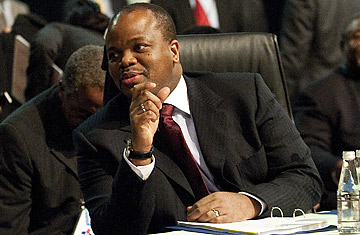
King Mswati III of Swaziland at the Southern African Development Community's extraordinary summit in Johannesburg on June 11, 2011
January's warning of an imminent economic meltdown in the tiny, landlocked kingdom of Swaziland set off alarm bells in its giant neighbor, South Africa. The International Monetary Fund (IMF) warned that the country of 1.5 million (the population of Phoenix) ruled by the continent's last absolute monarch, King Mswati III, was in "a fiscal crisis which threatens external stability and the soundness of the financial sector."
The global downturn had caused a 60% drop in 2010 revenues from the Southern African Customs Union — a joint duty arrangement with five countries on which the Swazi state depends for 40% of its budget — the treasury was all but empty; Swaziland was $145 million in debt; and its public-sector wage bill was proportionally one of the highest in Africa. Indeed, there was little economy to speak of: almost 70% of its population earned $1.25 a day or less. And all of that was before considering the debilitating effect on productivity and state finances of the fact that 1 in 4 Swazis has HIV.
Mswati, who was educated at the exclusive English private school of Sherborne and has an estimated personal fortune of $100 million, was unmoved. His Finance Minister, Majozi Sithole, raised the royal household budget by $5.8 million for the 2011-12 financial year, taking it to a whopping $30.3 million. Mswati also insisted that the construction of Sikhuphe International Airport, which has so far cost the country $200 million, would go ahead.
Nor was the King in the mood to debate matters: in April, when thousands of Swazi citizens demonstrated against him, Mswati's police beat and arrested hundreds of protesters. The following month, after the government missed yet another round of budget and currency-reserve targets and failed to reform income tax, IMF Swaziland mission chief Joannes Mongardini said the country "continues to face a severe fiscal crisis." And the African Development Bank also rejected a $150 million loan request. Swaziland was broke. Many speculated the monarchy was too. But its powerful neighbor was not about to let Swaziland fail.
It's not hard to see why South Africa came to Swaziland's rescue with a $350 million loan, to be paid in three installments from August to February. South Africa hopes to stave off the economic collapse of a second neighbor following the implosion of Zimbabwe, from which more than a million refugees have fled into South Africa. Says South African Finance Minister Pravin Gordhan: "It is not in South Africa's interest to have an economy that finds itself in trouble, which will eventually place a greater burden on South Africa." Catherine Grant Makokera, head of the economic-diplomacy program at the South African Institute of International Affairs, adds: "Maintaining regional stability was a key factor for South Africa to agree on the loan."
South Africa has made stringent economic and political reform a condition of the bailout, urging the King to open a "dialogue process to include all stakeholders and citizens." Still, the rescue of Africa's last absolute monarch is uncomfortable for South Africa's ruling African National Congress (ANC), the liberation movement that overthrew apartheid and rarely misses an opportunity to proclaim its democratic credentials. Mswati, by contrast, inherited his throne, and appoints Swaziland's Prime Minister and Cabinet, its judiciary and traditional leadership. In 2008, he banned Swaziland's main pro-democracy group, the People's United Democratic Movement (PUDEMO), after an earlier uprising.
Unsurprisingly, the loan has been criticized by the ANC's own Youth League and its allies in the trade-union federation Cosatu, while the opposition Democratic Alliance is demanding South Africa push for human rights and democracy. Swaziland's pro-democracy movement is appalled. "We have been sold out by the South African government," laments PUDEMO president Mario Masuku. The monarch does not deserve a "blank check to further loot the country," he says. Speaking from exile in Johannesburg, Swaziland Solidarity Network spokesperson Lucky Lukhele even alleged the loan was "informed by the close friendship between King Mswati and [South African] President Jacob Zuma." In 2002, Zuma, a noted polygamist himself, became engaged to Mswati's niece Sebentile Dlamini.
